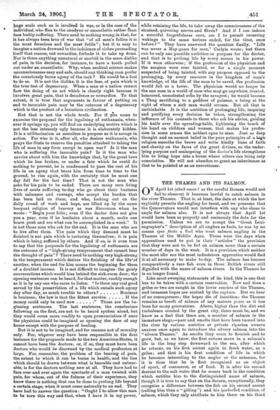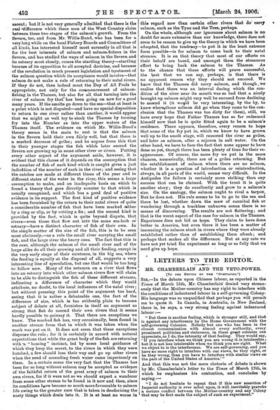THE THAMES AND ITS SALMON.
ON April 1st (absit omen ! as the careful Roman would not fail to observe) it becomes lawful to catch salmon in the river Thanies. That is, at least, the date at which the law explicitly permits the angling for trout, and we presume that the conservators would not interfere with any who chose to angle for salmon also. It .is not always that April 1st would have been so properly and ominously the date for the permission. Unless we are to accept the " Great Lexi- cographer's " description of all anglers as fools, he was by no means ipso facto a fool who went salmon angling in the Thames of the Middle Ages. Those were the days when apprentices used to put in their " articles " the provision that they were not to be fed on salmon more than a certain number of days in the week. It is a provision which neither the most idle nor the most industrious apprentice would find it at all necessary to make to-day. The salmon has become comparatively a rare fish even in those British rivers still dignified with the name of salmon rivers. In the Thames he is no longer found.
Like most sweeping statements of its kind, this is one that has to be taken with a certain reservation. Now and then a grilse or two are caught in the lower reaches of the Thames, and immense hopes are excited by the capture. But we hear of no consequences; the hopes die of inanition; the Thames remains as bereft of salmon of any mature years as it has been for many generations. Above, higher than the dirt and turbulence created by the great city, there must be, and we know as a fact that there are, a number of salmon in the immature stage,—parr and smelts that have been turned into the river by various societies or private riparian owners anxious once again to introduce the silvery salmon into the " Bayern Thames." As smelts they seem to flourish and to grow, but, as we know, the first serious move in a salmon's life is the long step downward to the sea, after which he returns, on his first ascent again to fresh water, as a grilse; and that is his first condition of life in which he becomes interesting to the angler or the netaman, for it is then that he is first recognised. as an object of sport, of commerce, or of food. It is after his second descent to the salt water that he comes back in the condition which entitles him to the distinguished name of salmon, though it is true to say that on the Severn, exceptionally, they recognise a difference between the fish on his second ascent (calling him then a " gilling ") and his perfected condition of salmon, which they only attribute to him there on his third ascent; but it is not very generally admitted that there is the real ;difference which these men of the West Country claim between these two stages of the salmon's growth. From the Severn, too, and from Mr. Willis-Band, who has been for a very long while on the local Fishery Boards and Committees of all kinds, has interested himself most earnestly in all that is for the best interests of salmon and salmon-fishers in the Severn, and has studied the ways of salmon in the Severn and its estuary most closely, comes the startling theory startling because of its opposition to all accepted doctrine, and because of the revolution in much present legislation and treatment of the salmon question which its acceptance would involve—that salmon do not make a rule of returning to their natal rivers. If they do not, then indeed must the Day of All Fools be appropriate, not only for the commencement of salmon- fishing in the Thames, but also for all that turning into the river of salmon fry that' has been going on now for a good many years. If the smelts go down to the sea—that at least is a point which is not disputed—and have no special disposition to return to one river rather than another, it would appear that we might as well try to stock the Thames by turning fry into the Humber as into the upper waters of the Thames itself. The evidence on which Mr. Willis-Buud's theory seems in the main to rest is that the salmon in the Severn hold their own fairly well, but that there is a marked decrease of grilse ; and be argues from this that in their younger stages the fish which later ascend the Severn are growing up in some other river or rivers. Putting every other aspect of the argument aside, however, it is evident that this clause of it depends on the assumption that the number of fish of each kind which is caught gives a just indication of the number of each in the river; and seeing that the catches are made at different times of the year and in different states of the water in the river, this seems a large assumption to make, and an inadequate basis on which to found a theory that goes directly counter to that which is usually recognised, and which has a good deal of positive evidence in its support. The first kind of positive evidence has been furnished by the return to their natal rivers of quite a considerable number of fish that have been marked either by a ring or clip, or by cutting a fin ; and the second kind is provided by the fact, which is quite beyond dispute, that rivers—even those that flow out into the same sea-loch or estuary—have a distinct character of fish of their own. In the simple matter of the size of the fish, this is to be seen most obviously,—as a rule the small river carrying the small fish, and the large river the heavy ones. The fact that this is the case, although the salmon of the small river and of the large alike do all their growing and all their feeding, except in the very early stage of their existence, in the big sea, where the feeding is equally at the disposal of all, suggests a very interesting line of speculation, but one that would be too long to follow now. Many of the netsmen on a river that flows into an estuary into which other salmon rivers flow will claim to be able to distinguish the fish of these different streams, indicating a difference of character which they would attribute, no doubt, to the local influences of the natal river ; but without pressing this point of the argument too hard, seeing that it is rather a debateable one, the fact of the difference of size, which is too evidently. plain to become subject of debate at all, furnishes in itself an argument so strong that fish do ascend their own rivers that it seems hardly possible to gainsay it. That there are exceptions we know. The marked fish has, very occasionally, been found in another stream from that in which it was taken when the mark was put on it. It does not seem that these exceptions disprove the rule ; for it is certainly in accord with natural expectations that while the great body of the fish are returning with -a " homing " instinct, led by some local guidance of which they keep the secret, to the rivers in which they were hatched, a few should lose their way and go up other rivers when the need of ascending fresh water came imperiously on them. In a certain sense the very fact that the Thames has been for so long without salmon may be accepted as evidence of the faithful return of the great army of salmon to their own rivers, for if it were not so we should expect a wanderer from some other stream to be found in it now and then, since its conditions hiLve become so much more favourable to salmon life owing to the greater care that is taken in deodorising the nasty things which drain into it. It is at least no worse in this, regard now than certain other rivers that do' carry salmon, such as the Tyne and the Tees, perhaps.
On the whole, although our ignorance about salmon is no doubt far more extensive than our knowledge, there does not seem to be reason to give up the theory in which we have been educated, that the tendency—to put it in the least extreme form possible—is for salmon to come back to their natal streams. It is on that theory that most of our efforts on their behalf are based, and amongst them the strenuous effort to bring back the salmon to the Thames. As to the chance that these efforts will prove successful, the best that we can say, perhaps, is that there is no apparent reason why they should not succeed. Wo know that the Thames did carry salmon, and though , we realise that there was an interval during which the con- dition of the river near its mouth was so bad that a nicely brought up salmon might very well be excused from declining to ascend it (it wotild be very interesting, by the by, to know where.those salmon did go when they came to the con- clusion that the Thames was too dirty for them), still, we have every hope that Father Thames has so far redeemed himself now that he is quite fitted again to be a salmon's residence. There appears, therefore, every reason to hope that some of the fry put in, which we know to have grown well up to The smolt stage, will reascend the river as grilse, and later as salmon, after a sojourn in salt water. On the other hand, we have to face the fact that none appear to have done so yet, though there has been plenty of time for their re- appearance. Of course, the more fry we put in the more chances, numerically, there are of a grilse returning. But the establishment of salmon where there are no salmon; whether it is a question of introduction or reintroduction, always, in all parts of the world, seems very difficult. In the Antipodes the failure is certainly more striking than any success that can be claimed. With the trout it is quite another story ; they do excellently and grow to a salmon's size. On the analogy, the salmon ought to rival a tarpon. But he does not. His rule seems to be to go to the sea and there be lost, whether down the maw of cannibal fish or wandering through a trackless unknown ocean there is no means of discovering. The results are not flattering; and that is the worst aspect of the case for salmon in the Thames. Experience does not bid us hope. They claim to have done better in America, but even there it has been a matter of increasing the salmon stock in rivers where they were already established rather than of establishing them afresh ; and perhaps that .makes all the difference. But at any rate we have not yet tried the experiment so long or so fully that we need give up hope.











































 Previous page
Previous page